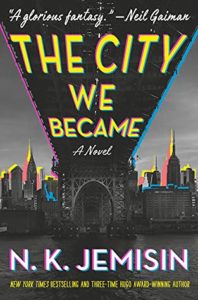
N.K. Jemisin may be the best there is in contemporary speculative fiction, and coming into last year, I’d read every single one of her solo-authored novels. But I had some reticence when she announced a novel-sized expansion of her Hugo-nominated short story “The City Born Great.” That story was heavy enough in unexplained New York references that, as someone who’s never been to the city, my eyes were glazing over by the end. But The City We Became was nominated for the Hugo Award for Best Novel, and so it went on my list. And, like basically everything else I’ve read by Jemisin, it was good.
“The City Born Great,” with some alterations near the end, serves as the prologue for The City We Became, a novel about the birth of the avatar for New York City and the Lovecraftian villain seeking to destroy him. The novel breaks from the short story by introducing individual avatars for each of the five boroughs—who serve as the five main protagonists—and it immediately alleviates the problem of unexplained NYC references by making the first avatar a recent transplant to the city. In coming into the fullness of his power, Manny instinctively knows plenty about Manhattan, but he needs the other four boroughs explained, which serves as an aid for the uninitiated reader.
The narrative then dives in to the story of the five New Yorkers who one suddenly become one with their boroughs. Each of them have their own lives and (mostly) their own histories, but they also serve as their borough in miniature, and through the magic of the city birthing process, their boroughs become extensions of themselves. And each has their own encounter with the Woman in White, the Enemy from another dimension that seeks to destroy New York before it can be fully born as a living city.
The concept of living cities fighting for the lives of themselves and all of their inhabitants provides a wildly creative backdrop, and Jemisin’s unique combination of raw, beautiful, and compulsively readable prose make The City We Became a pleasure to read. But unlike in her triple-Hugo-winning Broken Earth Trilogy, some aspects of the plot prove an awkward fit. There’s one threat that’s presented as intractable but is solved in a sentence, and there’s a multiverse storyline with complex and horrifying consequences that gets bypassed in a page or two and never explored further.
Meanwhile, the villain is so cartoonishly over-the-top that it can hurt immersion. It’s clear here that Jemisin is not seeking subtlety—the Woman in White uses many tools of white supremacy to rally opposition to the multicultural city of New York and its diverse avatars—and real world events certainly lend credence to the realism of that sort of evil, over-the-top or not. But nonetheless, the rhetoric is so extreme that it can be hard to understand how the in-story listeners are taken in.
In contrast, the main characters—despite in many ways representing stereotypes of their boroughs—are remarkably nuanced and well-drawn. It’s tough to paint five compelling protagonists in a single novel, and there is certainly some variance, but all five feel like distinct persons, and even the least sympathetic is totally compelling.
Overall, like with every Jemisin novel, there is a whole lot of good here. The characters, the prose, the concept, and one key facet of the ending are excellent. There’s not much subtlety, and that may bother some, but it’s clearly an intentional choice on the part of the author, and how well it works for a given reader is to some extent a matter of personal preference. On the other hand, the mishandling of a pair of significant plot points holds The City We Became from reaching the heights of some of her past work. There is a sequel planned, and so there is a chance of further explanation as the series progresses. But the handling of the multiverse storyline directly affects the main thematic thrust, and leaving it unexplored gives the series-starter a confusing message underneath the anti-racist bullhorn.
Recommended if you like: creative concepts, raw prose, unsubtle anti-racist messages.
Can I use it for Bingo? It fits the rare Chapter Titles hard mode, as well as hard mode for Found Family, plus the Book Club/Readalong and Trans/NB Character squares.
Overall rating: 15 of Tar Vol’s 20. Four stars on Goodreads.
